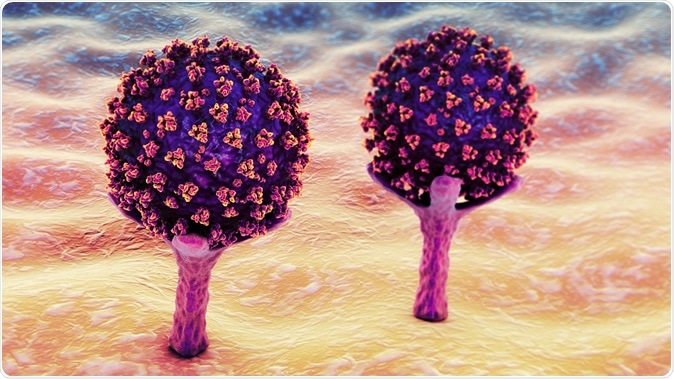Glycosaminoglycans can inhibit cell invasion by acute respiratory syndrome coronavirus 2 (SARS-CoV-2) and other coronaviruses, which supports the utilization of such therapeutics in the fight against coronavirus disease (COVID-19) – reports a new study available on the preprint server bioRxiv*.
As the world struggles with the COVID-19 pandemic, the scientific community found themselves amid the race for effective and scalable treatments, but also for a safe vaccine option. The pertinent question from the very beginning of this public health crisis was whether we could use some of the drugs we already have to tackle the disease.

 This news article was a review of a preliminary scientific report that had not undergone peer-review at the time of publication. Since its initial publication, the scientific report has now been peer reviewed and accepted for publication in a Scientific Journal. Links to the preliminary and peer-reviewed reports are available in the Sources section at the bottom of this article. View Sources
This news article was a review of a preliminary scientific report that had not undergone peer-review at the time of publication. Since its initial publication, the scientific report has now been peer reviewed and accepted for publication in a Scientific Journal. Links to the preliminary and peer-reviewed reports are available in the Sources section at the bottom of this article. View Sources
Glycosaminoglycans and their derivatives
The glycosaminoglycans are a group of polydisperse and heterogeneous natural products currently utilized as pharmaceuticals and nutraceuticals. Among them, unfractionated heparin, low molecular weight heparins, and heparinoids are clinically approved as anticoagulants with excellent bioavailability, stability, and safety pharmacokinetic profiles.
Importantly, glycosaminoglycans and their derivatives (some of which lack any significant anticoagulant activity) represent an under-exploited antiviral drug class, despite showing broad-spectrum activity against a myriad of different viruses.
More specifically, previous studies have demonstrated their antiviral properties against herpes viruses, flaviviruses, influenza virus, and human immunodeficiency virus (HIV). What is relevant for our current situation is that they are also effective against the whole family Coronaviridae, which includes SARS-associated coronaviruses.
Studying the interaction with SARS-CoV-2
"Glycosaminoglycans are generally well-tolerated and have been used successfully for many years with limited and manageable side effects", say study authors led by Courtney Mycrof-West of Keele University and Dr. Mark A. Skidmore of Keele University and the University of Liverpool.
In this new research endeavor, they aimed to study the ability of the SARS-CoV-2 Spike (S1) protein receptor-binding domain to interact with glycosaminoglycans, and whether that will influence the central strategy of the virus to attach to host cells.

SARS-CoV-2 viruses are binding to ACE-2 receptors on a human cell, the initial stage of COVID-19 infection. Conceptual 3D illustration credit: Kateryna Kon / Shutterstock
Their approach used circular dichroism spectroscopy, which detects changes in secondary protein structures that arise in a solution using ultraviolet radiation. Upon binding, any conformational changes are readily detected and quantified with the use of spectral deconvolution techniques.
A path towards tailor-made treatments
And indeed, the observed changes demonstrated how glycosaminoglycans interacted with the SARS-CoV-2 S1 receptor binding domain and induced specific conformational changes within this region.
This means that SARS-CoV-2 S1 receptor binding domain interacts with not only unfractionated heparin and low molecular weight heparins, but also other members of the glycosaminoglycan family of carbohydrates.
"These findings pave the way for future research into next-generation, tailor-made, glycosaminoglycan-based antiviral agents against SARS-CoV-2 and other members of the Coronaviridae", study authors explain the significance of their findings.
The next-generation antiviral agents
All these insights may prove to be important, as traditional drug development processes are slow and not very efficient against emerging threats such as the ongoing COVID-19 pandemic. This makes the repurposing of drugs that we already have a timely and viable alternative.
"It is noteworthy that the vast majority of commercially available glycosaminoglycan preparations remain a polydisperse mixture of natural products, containing both anticoagulant and non-anticoagulant saccharide structures", say study authors.
"These may prove to be an invaluable resource for next-generation, biologically active, antiviral agents that display negligible anticoagulant potential, whilst the former remains tractable to facile, chemical (and enzymatic) engineering strategies to ablate their anticoagulation activities", they add.
In any case, such medical preparations will be pliant to routine administration parenterally, but also directly via the respiratory tract by using nebulized solutions that will not have a significant systemic absorption.
This means even some remnant anticoagulant activity of certain glycosaminoglycans would not pose a problem, and the preparations may be suitable for prophylaxis and for patients under mechanical ventilation.
Consequently, such treatment approaches (even if proved only moderately effective) may substantially lessen the burden on health care institutions worldwide, and aid in tackling this disease before we have a vaccine ready.

 This news article was a review of a preliminary scientific report that had not undergone peer-review at the time of publication. Since its initial publication, the scientific report has now been peer reviewed and accepted for publication in a Scientific Journal. Links to the preliminary and peer-reviewed reports are available in the Sources section at the bottom of this article. View Sources
This news article was a review of a preliminary scientific report that had not undergone peer-review at the time of publication. Since its initial publication, the scientific report has now been peer reviewed and accepted for publication in a Scientific Journal. Links to the preliminary and peer-reviewed reports are available in the Sources section at the bottom of this article. View Sources